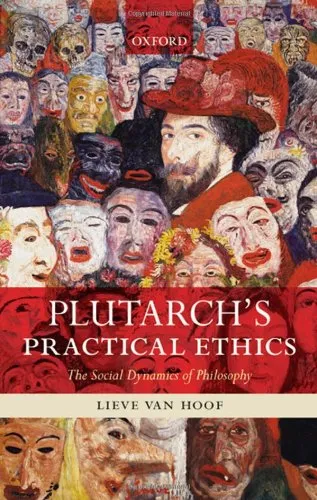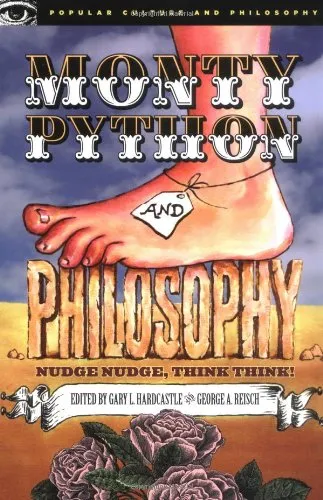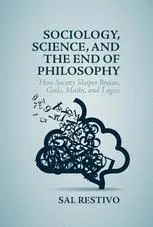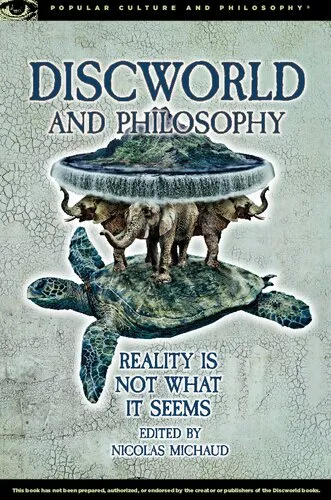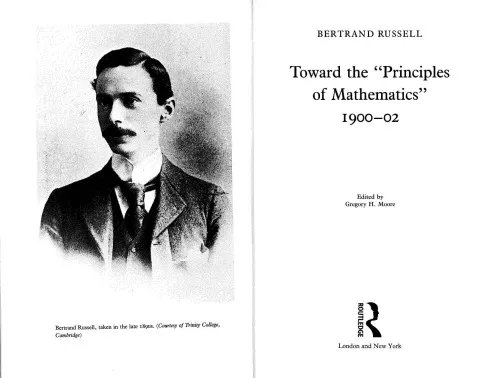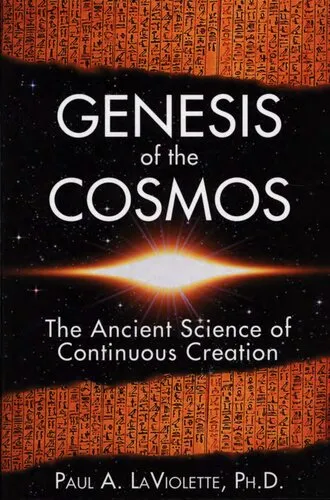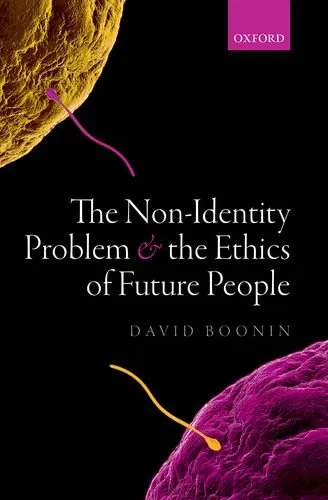Plutarch's Practical Ethics: The Social Dynamics of Philosophy
4.0
بر اساس نظر کاربران

شما میتونید سوالاتتون در باره کتاب رو از هوش مصنوعیش بعد از ورود بپرسید
هر دانلود یا پرسش از هوش مصنوعی 2 امتیاز لازم دارد، برای بدست آوردن امتیاز رایگان، به صفحه ی راهنمای امتیازات سر بزنید و یک سری کار ارزشمند انجام بدینکتاب های مرتبط:
معرفی کتاب "Plutarch's Practical Ethics: The Social Dynamics of Philosophy"
کتاب "Plutarch's Practical Ethics: The Social Dynamics of Philosophy" اثری پژوهشی و عمیق از لیو ون هوف است که به بررسی نقش و کاربرد فلسفه در زندگی عملی بر اساس آثار پلوتارک میپردازد. این کتاب تلاش میکند تا اخلاق عملی پلوتارک را در بستر اجتماعی و تاریخی خودش قرار دهد و نشان دهد که چگونه فلسفه در عرصههای مختلف زندگی اجتماعی یونان و روم باستان تأثیرگذار بوده است.
خلاصهای جامع از کتاب
پلوتارک، یکی از بزرگترین نویسندگان و فیلسوفان دوران باستان، در آثار خود به دنبال پیوند دادن نظریههای فلسفه با عمل بود. در این کتاب، نویسنده تلاش میکند تا اخلاق عملی (Practical Ethics) پلوتارک را از منظر فلسفی و اجتماعی بررسی کند. لیو ون هوف توضیح میدهد که اعمال اخلاقی چگونه به واسطه شبکههای اجتماعی و تعاملات انسانی در جامعه زمان پلوتارک گسترش یافتهاند.
کتاب از سه بخش اصلی تشکیل شده است: معرفی اخلاق عملی پلوتارک، بررسی تأثیر اجتماعی فلسفه در بین طبقات اجتماعی، و نتیجهگیری درباره نقش فلسفه در زندگی روزمره. نویسنده با تحلیل عمیق مقالات و گفتارهای پلوتارک نشان میدهد که چگونه اندیشههای اخلاقی نهتنها برای توسعه شخصیت فردی بلکه برای همکاری و تقویت بنیادهای اجتماعی بااهمیت هستند.
نکات کلیدی کتاب
- تأکید پلوتارک بر جنبه عملی فلسفه و ترکیب آن با زندگی روزمره افراد.
- نقش شبکههای اجتماعی و تعاملات انسانی در انتشار و پذیرش مفاهیم اخلاقی.
- اهمیت هماهنگی میان فرد و جامعه در مسیر تعالی اخلاقی.
- درک مشترک از فلسفه به عنوان ابزاری برای حل مشکلات روزمره و رشد اجتماعی.
- بررسی عمیق پیوند میان ارزشهای فلسفی و الزامات اجتماعی در دوران باستان.
نقلقولهای مشهور از کتاب
"Philosophy is not merely a theoretical exercise but a practical guide for living well within a community."
"Through the lens of Plutarch, ethics bridges the gap between personal virtue and social responsibility."
"The interactions between individuals shape the moral fabric of society, making philosophy an inherently social activity."
چرا این کتاب مهم است؟
کتاب "Plutarch's Practical Ethics: The Social Dynamics of Philosophy" اثری منحصربهفرد است که به یکی از جنبههای کمتر بررسیشده فلسفه باستان میپردازد. این کتاب با ارائه تحلیلی از آثار پلوتارک، نقش فلسفه را به عنوان ابزاری کاربردی در جامعه برجسته میسازد، نه صرفاً نظامی نظری که دور از زندگی عادی انسانهاست.
اهمیت دیگر این اثر در این است که نشان میدهد چگونه مفاهیم و ارزشهای اخلاقی میتوانند به انسجام اجتماعی کمک کنند و تعاملات بشری را تقویت کنند. برای علاقهمندان به فلسفه، تاریخ و اخلاق، این کتاب یک منبع جامع و جذاب خواهد بود که تفکر و تحقیق را به شیوهای جدید و عملیتر هدایت میکند.
Introduction to "Plutarch's Practical Ethics: The Social Dynamics of Philosophy"
"Plutarch's Practical Ethics: The Social Dynamics of Philosophy" is a scholarly deep-dive into the works of Plutarch, one of the most significant philosophers and biographers of antiquity. Written by Lieve Van Hoof, this book examines how Plutarch’s philosophical guidance is deeply intertwined with the social dynamics of his time, positioning philosophy not merely as an abstract or theoretical pursuit, but as a practical tool for addressing life's challenges and reinforcing personal and societal harmony. By revisiting Plutarch’s ethical writings, this work sheds light on the practical application of philosophy to everyday life and its importance in fostering interpersonal relationships, citizenship, and moral reasoning.
Detailed Summary of the Book
Lieve Van Hoof’s meticulously researched book delves into the ethical treatises written by Plutarch, a Greek philosopher, and how they served as a means to mediate between personal values and public life in a competitive social setting. The text particularly highlights Plutarch’s emphasis on philosophy as a practice meant to cultivate virtues, offer practical resolutions to strife, and align individual conduct with communal expectations.
The book is structured around Plutarch's essays, revealing the situational contexts in which these writings were composed and circulated. Van Hoof illustrates how various essays, such as those discussing self-reflection, anger, and friendship, were tailored to address specific audiences and social contexts. Moreover, it becomes apparent that philosophy, in Plutarch’s hands, is a dynamic tool used to negotiate power, build relationships, and maintain harmony among peers and within communities.
Throughout the book, Van Hoof explores themes like the interplay between philosophy and politics, ethics and education, and the obligations of civic life. The central argument revolves around the idea that philosophy, for Plutarch, was not an isolated intellectual endeavor but a powerful force embedded in the fabric of social relations. The work not only analyzes Plutarch’s philosophical practices but also provides insights into the Greco-Roman cultural milieu, helping readers understand the cultural resonance of his teachings and their relevance for modern readers navigating similar ethical dilemmas.
Key Takeaways
"Plutarch's Practical Ethics" offers profound lessons that extend far beyond antiquity. Here are some key takeaways from the book:
- Philosophy is a practical endeavor meant to solve real-world problems and guide moral behavior.
- Plutarch emphasized self-growth and individual reflection as vital steps toward improving public and private life.
- Social harmony depends on understanding and mastering one’s emotions, such as anger, envy, and pride, while nurturing relationships like friendship and mentorship.
- The cultural dimensions of philosophy, especially in its interplay with politics and societal roles, cannot be overlooked.
- The communicative dimension of philosophy—how and why ideas are expressed to particular audiences—is just as important as the ideas themselves.
Famous Quotes from the Book
The following quotes from "Plutarch's Practical Ethics" illustrate the timeless relevance of the text as interpreted by Lieve Van Hoof:
"Philosophy is more than intellectual exercise; it serves as a mirror, reflecting one’s life struggles while refining virtues to face them with courage and wisdom."
"In a world rife with competition, philosophy offers a moral compass, helping individuals transcend their personal ambitions for greater communal good."
"The success of a philosopher is measured not by how well they articulate theories, but by how effectively they inspire actions in others and resolve real conflicts."
Why This Book Matters
"Plutarch's Practical Ethics: The Social Dynamics of Philosophy" stands out as an essential read for anyone who wishes to understand how classical philosophy can remain relevant in addressing modern ethical and personal dilemmas. Lieve Van Hoof’s detailed analysis of Plutarch’s writings portrays philosophy as a timeless tool for personal growth and societal balance.
The book is invaluable to scholars of philosophy, history, and classics, as well as to anyone interested in the interplay of ideas and human relationships. By reviving Plutarch’s unique blend of practical ethics and social engagement, the book resonates with readers seeking wisdom from antiquity that speaks directly to today’s challenges, such as navigating interpersonal conflicts, fostering meaningful relationships, and balancing personal aspirations with communal responsibilities. Ultimately, the work underscores the enduring importance of philosophy as a means of connecting individuals to their communities and to their better selves.
دانلود رایگان مستقیم
شما میتونید سوالاتتون در باره کتاب رو از هوش مصنوعیش بعد از ورود بپرسید
دسترسی به کتابها از طریق پلتفرمهای قانونی و کتابخانههای عمومی نه تنها از حقوق نویسندگان و ناشران حمایت میکند، بلکه به پایداری فرهنگ کتابخوانی نیز کمک میرساند. پیش از دانلود، لحظهای به بررسی این گزینهها فکر کنید.
این کتاب رو در پلتفرم های دیگه ببینید
WorldCat به شما کمک میکنه تا کتاب ها رو در کتابخانه های سراسر دنیا پیدا کنید
امتیازها، نظرات تخصصی و صحبت ها درباره کتاب را در Goodreads ببینید
کتابهای کمیاب یا دست دوم را در AbeBooks پیدا کنید و بخرید
1249
بازدید4.0
امتیاز0
نظر98%
رضایتنظرات:
4.0
بر اساس 0 نظر کاربران
Questions & Answers
Ask questions about this book or help others by answering
No questions yet. Be the first to ask!
